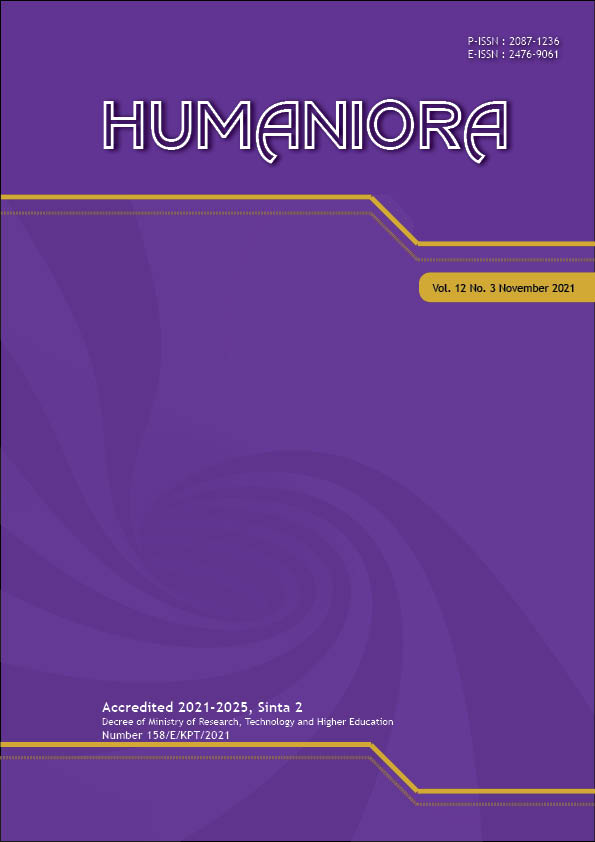Local Wisdom Ulur-Ulur Tlaga Buret Ceremony in Tulungagung
DOI:
https://doi.org/10.21512/humaniora.v12i3.7024Keywords:
local wisdom, wisdom values, Javanese culture, Ulur-ulurAbstract
The aims of the research were to describe the Ulur-ulur traditional ceremony, the procession, and the values of local wisdom in it. The research applied a qualitative study using a snowball sampling method with passive participant observation techniques and interviews. The researchers conducted in-depth interviews with note-taking and one-on-one interview techniques, namely by asking questions to the informants one by one and then recording the answers from the informants. The data validated by the source triangulation method were then analyzed using the Miles and Huberman research method which included data reduction, data presentation, and conclusion drawing. The research result shows that (1) the Ulur-ulur ceremony is one of the rituals that manifests the residents’ gratitude for the abundant water sources for the residents’ rice fields. (2) Ulur-ulur traditional ceremony procession consists of the preparation stage, jodhang procession, jamasan of Dewi Sri and Jaka Sedana statues, prayers and kajat, sowing flowers, and closes with a typical art performance of Tulungagung regency. (3) The practice of Ulur-ulur traditional ceremony has local wisdom values: religious, social, educational, historical, and economic values.
References
Brata, I. B. (2016). Kearifan budaya lokal perekat identitas bangsa. Jurnal Bakti Saraswati, 5(1), 9-16.
Dahliani., Soemarno, I., & Setijanti, P. (2015). Local wisdom in built environment in globalization era. International Journal of Education and Research, 3(6), 157-166.
Dananjaya, J. (1991). Folklor Indonesia ilmu gosip, dongeng, dan lain-lain (3rd ed.). Jakarta: PT Temprint.
Fajarini, U. (2014). Peranan kearifan lokal dalam pendidikan karakter. Sosio Didaktika: Social Science Education Journal, 2(1), 123-130. https://doi.org/10.15408/sd.v1i2.1225.
Fatimah, F. N., Sulistyo, E. T., & Saddhono, K. (2017). Local wisdom values in Sayu Wiwit folklore as the revilization of behaviorisme education. Karsa: Journal of Social and Islamic Culture, 25(1), 179-199. https://doi.org/10.19105/karsa.v25i1.1266.
Haryadi, F. (2013). Nilai kearifan lokal dalam upacara adat Ritus Tiwu Panganten di kecamatan Babakan kabupaten Cirebon (Analisis struktural-semiotik). Lokabasa: Jurnal Kajian Bahasa, Sastra dan Budaya Daerah serta Pengajarannya, 4(2), 112-121. https://doi.org/10.17509/jlb.v4i2.3133
Hidayatuloh, S. (2019). Nilai-nilai kearifan lokal upacara adat Ngikis di situs Karangkamulyan kabupaten Ciamis. Patanjala, 11(1), 97-113. https://doi.org/10.30959/patanjala.v11i1.445.
Machmud, M. (2013). Heritage media and local wisdom of Indonesian society. Global Journal of Human Social Science, Arts, and Humanities, 13(6), 57-66.
Rais, W. A. (2017). Kearifan lokal dalam bahasa dan budaya Jawa: Studi kasus masyarakat nelayan di Pesisir Selatan Kebumen Jawa Tengah (Kajian etnolinguistik) (1st Ed.). Surakarta: UNS Press.
Ratih, D. (2019). Nilai-nilai kearifan local dalam tradisi Misalin di kecamatan Cimaragas kabupaten Ciamis. Istoria: Jurnal Pendidikan dan Sejarah, 15(1), 45-57. https://doi.org/10.21831/istoria.v15i1.24184.
Royyani, M. F. (2008). Upacara Seren Taun di Cigugur, kabupaten Kuningan, Jawa Barat: Tradisi sebagai basis pelestarian lingkungan. Jurnal Biologi Indonesia, 4(5), 399-415. http://dx.doi.org/10.14203/jbi.v4i5.3222.
Saddhono, K., Setiawan, B., Yuliningsih, Y., & Rahmaniar, F. (2019). Local wisdom on Nyadran tradition in Sragen regency. Proceedings of the 2nd International Conference on Local Wisdom, INCOLWIS 2019. Padang, Indonesia. pp 1-6. http://dx.doi.org/10.4108/eai.29-8-2019.2288957.
Setyawan, B. W. (2016). Learning method based on local wisdom for language learning Javanese. Proceeding International Conference on Education and Training. Malang, Indonesia.
Supratno, H. (2010). Aktulaisasi nilai-nilai tradisi lisan berwawasan kepulauan sebagai model pendidikan karakter bangsa. Ambon: Himbasadi.
Tricahyono, D., & Sariyatun, S. (2021). Tradisi ulur-ulur ditinjau dari pendekatan konstruktivisme sebagai upaya penguatan pendidikan nilai dalam pembelajaran IPS. Aksara, 7(1), 79-88. http://dx.doi.org/10.37905/aksara.7.1.79-88.2021.
Wicaksono, P. I. (2018). Studi pelaksanaan upacara Ulur-Ulur desa Sawo kecamatan Campurdarat kabupaten Tulungagung tahun 2018. Jurnal Simki Pedagogia, 3(4), 1-14.
Wulan, D. R. R., Suyitno, S., & Rohmadi, M. (2018). The education values of Susuk Wangan tradition as the forming of character in the milenial era. El-Harakah: Jurnal Budaya Islam, 20(2), 215-231. https://doi.org/10.18860/el.v20i2.4931.
Yuliningsih, Y., Saddhono, K., & Setiawan, B. (2018). Religious value in Nyadran ceremony in Ngepringan village, Sragen. El-Harakah: Jurnal Budaya Islam, 20(2), 155-173. https://doi.org/10.18860/el.v20i2.4981.
Downloads
Published
How to Cite
Issue
Section
License
Copyright (c) 2021 Eka Nurwaselina Santoso Santoso, Nugraheni Eko Wardani, Atikah Anindyarini

This work is licensed under a Creative Commons Attribution-ShareAlike 4.0 International License.
Authors who publish with this journal agree to the following terms:
a. Authors retain copyright and grant the journal right of first publication with the work simultaneously licensed under a Creative Commons Attribution License - Share Alike that allows others to share the work with an acknowledgment of the work's authorship and initial publication in this journal.
b. Authors are able to enter into separate, additional contractual arrangements for the non-exclusive distribution of the journal's published version of the work (e.g., post it to an institutional repository or publish it in a book), with an acknowledgment of its initial publication in this journal.
c. Authors are permitted and encouraged to post their work online (e.g., in institutional repositories or on their website) prior to and during the submission process, as it can lead to productive exchanges, as well as earlier and greater citation of published work.
USER RIGHTS
All articles published Open Access will be immediately and permanently free for everyone to read and download. We are continuously working with our author communities to select the best choice of license options, currently being defined for this journal as follows: Creative Commons Attribution-Share Alike (CC BY-SA)
























